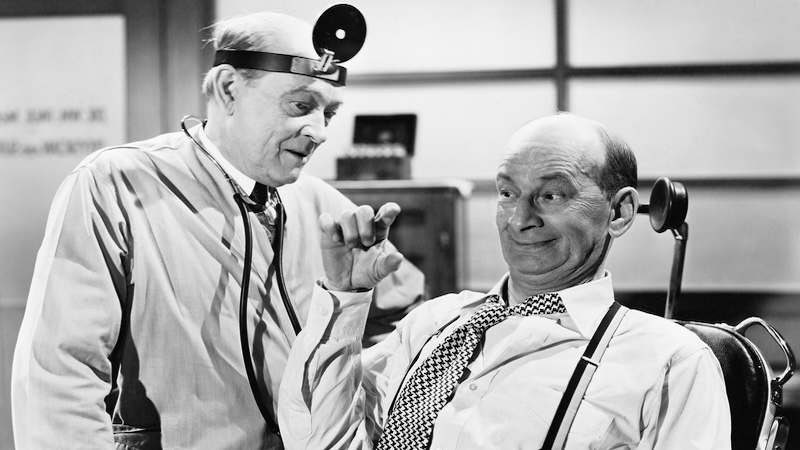‘Doctor, Please Spare Me the Terminology’
Is my problem ‘up there,’ ‘down there’ or ‘in there’?

After undergoing several medical procedures with the accompanying medical jargon, humorist Greg Schwem proclaims, “Doctor, please spare me the terminology” and offers some simple alternatives.
Recently I underwent an MRI after my podiatrist suspected an Achilles tear in my right foot.
The procedure confirmed his suspicions; I did indeed have a “tiny low-grade partial-thickness interstitial tear at the calcaneal attachment with mild dorsal superior calcaneal hypertrophic change.” Thankfully, there was no “retrocalcaneal bursitis.”
A few months earlier, persistent neck pain forced me to lie in an MRI machine, aka “a tube,” for 30 minutes. This procedure revealed “straightening of the cervical lordosis with trace, stepwise retrolisthesis from C4-5 through C6-7.” But before you, my loyal readers, express alarm, rest assured the MRI did not reveal any “concerning osseous lesions.”
I DO wish to thank readers and friends for their support last year when I underwent surgery for colon cancer, which my doctor referred to as an “invasive moderately differentiated adenocarcinoma arising within a tubular adenoma.” At least I had “unremarkable margins of resection” as well as an “unremarkable appendix.” My appendix may beg to differ.
If you’re keeping score, in the past 18 months I’ve had issues “up there,” “down there” and “in there.” Thankfully, my skilled oncology surgeon was able to get whatever was “in there,” “out of there.”
I believe this is the terminology all physicians should use when interacting with patients. Modern technology has enabled us all to have patient portal access, where we can quickly read results of our latest physicals, X-rays and surgical procedures. What follows is hours spent on Google and ChatGPT, copying and pasting our doctor’s jargon into the search boxes and adding “what does this mean?”
Doctor, please spare me the terminology you learned during the eight, 15 or 42 years it took you to complete medical school. Just identify which geographical area of my body is hurting and what you’re going to do to fix it.
In my experience, “up there” is the most embarrassing; “down there” is highly personal and “in there” is the most problematic. A friend recently had some lesions removed from her face and warned me of her appearance, which consisted of swelling around her eyes and extensive bandaging.
“I look horrible up there,” she said.
“Did your doctor confirm your diagnosis?” I said.
“I dunno. Let me check the portal.”
I believe we all should keep “down there” issues to ourselves. Nobody wants to hear about your prostate, your menstrual cramps, your last gynecological exam or your inability to poop regularly. At least not at the dinner party. Six years ago I suffered from kidney stones. My wife, now my ex-wife, feigned sympathy each time I emerged from the bathroom with progress reports concerning my attempts to pass one
“Want to see it?” I said, after my fourth attempt proved successful.
“Uh, no,” she replied. “Can I use the bathroom now?”
“In there” issues, as discussed previously, are most concerning. Tumors and blockages fall into this category. Tell me you have something “in there” and I will immediately ask if you need groceries, a ride to the hospital or a shoulder to cry on.
Mind you, this obsession with sharing technical jargon is not limited to the medical profession. Recently I discovered my website was inoperable. A frantic call to my hosting provider revealed my A record needed to be updated and THAT was what was causing the DNS_PROBE_FINISHED_NXDOMAIN error.
But most of us admit we have no idea how to run computers. Conversely, we feel we know our bodies better than anyone and, therefore, should have every piece of information available when something doesn’t feel right.
Our physicians begrudgingly comply, writing their findings in our patient portals, only to have those findings questioned when a search engine spits out contrary jargon and opinions on what should occur next.
Which is why I think we would all feel better if we just let our physicians worry about what was up there, down there or in there. So far it’s worked for me. I’m cancer free and my feet and neck feel great.
Now I just have to pay them for their services. I vaguely remember receiving a bill over the weekend from the hospital. I cleaned my condo but can’t locate it.
But it’s somewhere “around here.”
Greg Schwem is a veteran comedian, motivational speaker, and humor specialist known for blending business insights with standup comedy. He is also the author of three Amazon bestsellers. His latest, “Turning Gut Punches into Punch Lines: A Comedian’s Journey Through Cancer, Divorce and Other Hilarious Stuff,” was released in September 2024. Visit Greg on the web at www.gregschwem.com.
©2025 Greg Schwem. Distributed by Tribune Content Agency, LLC.
Read more Boomer humor from Greg Schwem here
Like laughing? Check out Boomer articles on laughter or the baby boomer humor of Randy Fitzgerald.



